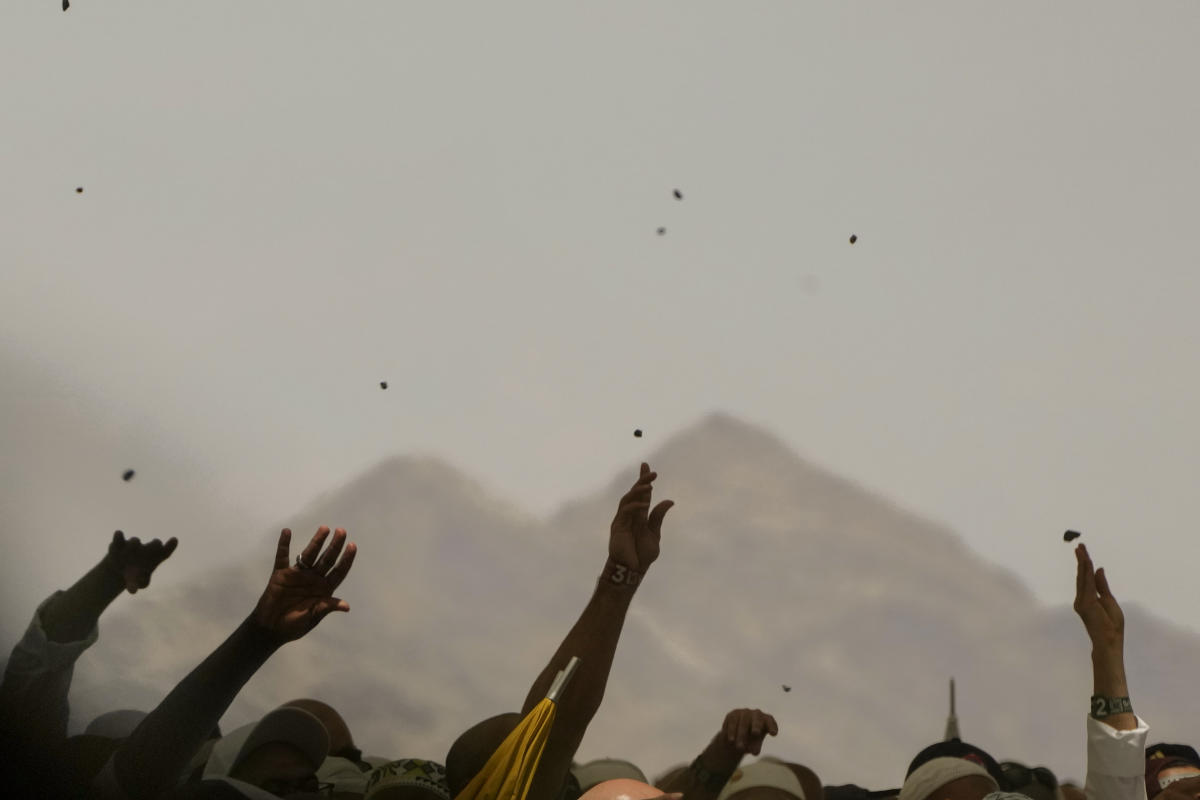Once a year, Muslim pilgrims streaming into Saudi Arabia join in a series of religious rituals and acts of worship as they perform the hajj, one of the pillars of Islam. While fulfilling a religious obligation, they immerse themselves in what can be for them the spiritual experience of a lifetime and an opportunity to seek God’s forgiveness and the erasure of past sins.
Here’s a look at the pilgrimage and its significance for Muslims.
WHAT IS HAJJ?
The Hajj is the annual Islamic pilgrimage to Mecca in Saudi Arabia, obligatory once in a lifetime for every Muslim who can afford it and is physically able to perform it. Some Muslims make the journey several times.
The Hajj is one of the five pillars of Islam, along with the profession of faith, prayer, almsgiving and fasting.
WHEN IS THE HAJJ?
The Hajj takes place once a year during the Islamic lunar month of Dhul-Hijja, the 12th and last month of the Islamic calendar year. This year the Hajj will take place this month.
WHAT IS THE MEANING OF HAJJ FOR MUSLIMS?
For pilgrims, performing the Hajj fulfills a religious obligation, but for many it is also a deeply spiritual experience of their lives. It is seen as an opportunity to seek God’s forgiveness for past sins, to grow closer to God and to follow in the footsteps of prophets.
Communally, the Hajj unites Muslims of different races, ethnicities, languages and economic classes from all over the world in performing religious rituals and acts of worship of God at the same time and place. That gives many a feeling of unity, connection, humility and equality. Pilgrims also show up with their own personal wishes, desires and experiences.
Many pilgrims bring prayer requests from family and friends that they would like to have expressed on their behalf.
Some spend years hoping and praying that one day they can perform the hajj, or save money and wait for a permit to begin the journey.
Nearly 2.5 million Muslims performed the hajj in 2019 before the coronavirus pandemic disrupted religious and other gatherings around the world and took its toll on the Islamic pilgrimage. Last year’s Hajj was the first to be held without COVID-19 restrictions since the pandemic began in 2020.
Before the trip, preparations may include packing various supplies for the physically demanding journey, seeking tips from those who have done the pilgrimage before, attending lectures, or consuming other educational materials on how to series of hajj rituals correctly, but also spiritually. to prepare oneself.
Sometimes pilgrims brave intense heat or other challenging conditions during the pilgrimage.
WHAT ARE SOME RITUALS THAT PILGRIMS PERFORM?
Pilgrims make the intention to perform Hajj and they enter a state of ‘ihram’. Being in ihram means adhering to certain rules and prohibitions. For example, men are not allowed to wear regular sewn or stitched clothing that hugs the body, such as shirts, during ihram there are simple ihram garments for men instead. Scholars say the purpose is to lay aside luxury and vanity, cast off worldly status symbols, and immerse the pilgrim in humility and devotion to God.
A spiritual highlight of the Hajj for many is standing on the Plain of Arafat, where pilgrims praise God, beg for forgiveness and make supplications.
Other rituals include performing ‘tawaaf’, circumambulating or turning counter-clockwise around the Kaaba in Mecca seven times.
Muslims do not worship the Kaaba, a cube-shaped structure that they view as the metaphorical house of God; it is the focal point that devout Muslims face in their daily prayers anywhere in the world.
Pilgrims also follow the path of Hagar, or Hajar, wife of the prophet Ibrahim, Abraham to Jews and Christians, who Muslims believe ran between two hills seven times in search of water for her son.
Among other rituals, pilgrims throw stones in a symbolic stoning of the devil.
WHAT IS EID AL-ADHA?
Eid al-Adha, or the ‘Feast of Sacrifice’, is the Islamic holiday that begins on the 10th day of the Islamic lunar month of Dhul-Hijja, during the Hajj.
Celebrated by Muslims around the world, Eid al-Adha marks Prophet Ibrahim’s test of faith and his willingness to sacrifice his son as an act of submission to God. During the festive holiday, Muslims slaughter sheep or cattle and distribute some meat to the poor.
___
Associated Press religion reporting is supported by the AP’s partnership with The Conversation US, with funding from Lilly Endowment Inc. The AP is solely responsible for this content.
